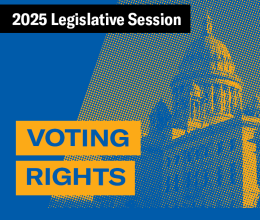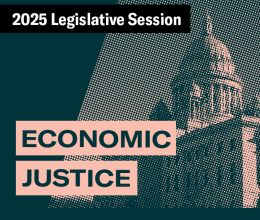
In a victory for voting rights at a time when efforts to impose barriers on the right to vote are percolating across the country, R.I. Superior Court Judge Sarah Taft-Carter today ruled unconstitutional a policy of the Bonnet Shores Fire District (BSFD) in Narragansett that bars residents from voting if they own less than $400 of property in the district. That same policy allows thousands of non-resident beach cabana owners – including commercial businesses and those owning sixteen square feet “bathroom units” – to exercise the right. The lawsuit was brought by seven residents of the district in 2020, and the ACLU of Rhode Island had filed a “friend of the court” brief in support of their challenge.
In rejecting the BSFD’s argument that it exercised only “narrow” powers for a beach community to justify its denial of voting rights to some residents, Judge Taft-Carter noted that there was “no genuine issue of dispute that the BFSD actively exercises governmental powers that make BSFD elections matters of general interest to all residents.” Taft-Carter cited the District’s various taxing powers, provision of sanitation services, and enactment of ordinances governing such activities as parking, loitering and consuming alcoholic beverages in public that included monetary fines. Among those excluded from voting were individuals who rent property in the district and spouses or adult children of title holders.
Taft-Carter stated: “The Court cannot conceive of any circumstances in which the BSFD could permissibly use the property ownership requirement to prevent otherwise qualified residents from voting in BSFD elections. Given the undisputed facts of this case, the unavoidable conclusion is that the BSFD Charter’s denial of district residents’ right to vote on the basis of property ownership is unconstitutional.”
However, the court held that more evidence was needed before she could decide a second claim of the plaintiffs – that also allowing non-resident property owners to vote unconstitutionally diluted the voting rights of residents.
The ACLU’s brief in support of the plaintiffs, filed last year by cooperating attorneys James Rhodes and Lynette Labinger, had argued that in “restricting the right to vote to certain ‘property owners,’ the BSFD follows in a long, justifiably discredited, history in this country and state in restricting the right to vote to a favored class.” In providing a short historical overview of the right to vote in the state, the ACLU brief noted that “Rhode Island shares the country’s unenviable history of limiting the franchise on the basis of race, gender, and wealth.” The brief labeled BSFD’s restriction on the right to vote to property owners “a throwback to earlier, long-discredited notions of who is entitled to participate in our state and local government.”
ACLU of RI cooperating attorney Labinger said today: “The Court’s comprehensive and thoughtful decision should send a message to the many local government fire districts—particularly those regulating aspects of beach and shoreline communities—that these districts, which exercise government functions, cannot justify denying the vote to local residents who don’t own property just because they don’t have a fire department.”
The ACLU said it planned to review the charters of other fire districts in the state and consider taking legal action against those that imposed similar voting restrictions on non-property-owning residents.

